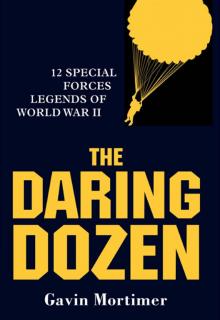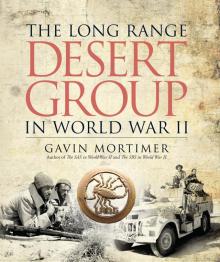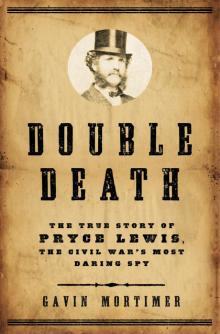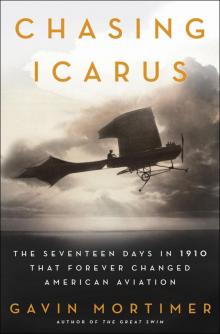- Home
- Gavin Mortimer
Double Death Page 10
Double Death Read online
Page 10
The major appreciated the delicacy of Lewis’s position but might he not talk informally to the men perhaps? Lewis relented, and after supper he was introduced to the militia over a whiskey. Then the major sprang his trap. Calling for quiet, he told his men that Lewis wished to address them. Standing in the parlor of the major’s house, surrounded by a large number of rebel soldiers, Lewis “went over England’s history and spoke for half an hour using most of the arguments of my former speech, spinning the cotton plea down fine.” When he’d finished, Lewis had practically convinced himself that Britain must wage war against the North. He broke into a rousing rendition of “God Save the Queen!” and its finale was greeted with three tremendous cheers.
Later the major apologized for the ambush, but Lewis laughed it off. He liked Browning and considered him “an excellent old fellow, one of the rarest and best characters I ever met.” He was also a diligent host, and when three of the militia began playing their fiddles he insisted Lewis watch some Southern-style dancing. There were no women present, just rough mountain men letting off steam on the eve of battle. Lewis politely clapped his hands to the beat of the music, and “it was past two o’clock before I could get away.”
Three hours later Lewis was roused by Bridgeman. He dressed with his eyelids still half closed, then made his way downstairs. Waiting in the lobby was Major Browning and several members of the militia. Lewis sensed something was up. The major took his arm and whispered, “Let’s go upstairs.” Lewis was led back to his room, conscious that there was a quiet firmness about the major. Browning stepped aside and motioned for Lewis to enter first.
The Englishman watched as the major shut the door and then reached inside his tunic pocket. It was a telegram, he was sure of it, ordering his arrest, “but, no, it was a bottle!” The major wanted Lewis to share a final toast and thrust a bottle of homemade wine toward Lewis. The Englishman took a swig. It was revolting, but he swallowed, for queen and country.
Eventually they set off amid more detonating cheers with one of Browning’s mounted soldiers as a guide. For twelve miles he escorted them toward the mountain, and then, wishing them the best of luck, he turned for Logan. For the rest of the day, Saturday, July 13, they headed southwest. Frequently Lewis stuck his head out of the window and looked back along the rough trail, each time dreading the distant sight of galloping horsemen—Browning and his men alerted to the deception. But nothing marred the beautiful landscape. Late in the afternoon they reached the farm of the major’s friend, and Lewis handed him the letter of introduction. They ate, washed and slept, and were on the move early next morning as dawn mottled the night sky.
Not until they had crossed the Big Sandy River and were traveling through Pike County did their stomachs begin to unknot. After spending Sunday night in a guesthouse they pushed on north to Catlettsburg, at the confluence of the Big Sandy and Ohio rivers, and then covered the six miles to Ironton. They were “quite fagged out” as they fell into bed on Monday, but they knew they had to relay their information without delay. On Tuesday morning they took the steamer west to Cincinnati. Lewis and Bridgeman sat on deck, smoking and talking, and agreeing that though “we had been gone only nineteen days … it seemed like an age.” For Lewis there was no respite once he reached Cincinnati. Pinkerton cabled news of Lewis’s remarkable mission to McClellan’s headquarters, and the Englishman was ordered to report his findings to General Cox without delay. To his consternation, Lewis learned that Cox had established his command at Poca, a village at the confluence of the Kanawha and Pocatalico rivers, half a dozen miles upstream from Camp Tompkins and the generous hospitality of Colonel Patton.
*The Indian Mutiny began in May 1857 when Indian soldiers rebelled against British rule. The unrest spread throughout India, involving atrocities on both sides, before the British reestablished control the following year.
C H A P T E R T E N
“Do You Mean to Say That You Have Been in Wise’s Camp?”
A CONTEMPORARY OF GENERAL JACOB DOLSON COX described him as “six feet in height, very erect and slender, his weight about one hundred and forty-five pounds. His hair was fine, dark brown, worn rather long, and always brushed with scrupulous care. His beard was full and, when allowed to grow long, became wavy … his prominent brow betokened deep thought. The searching deep-set eyes were those of a man who saw everything, and saw clearly.”
He had been born thirty-two years earlier in Montreal, where his father, a New York architect, was designing the suspended ceiling of the city’s Notre Dame Cathedral. Cox had no wish to emulate his father; law was his vocation, and he was admitted to the bar in 1852. Seven years later Cox was elected to the Ohio State Senate, but ill health dogged his term, and attacks of quinsy and diphtheria laid him low for much of 1860. Nevertheless, when war broke out, Governor William Dennison of Ohio appointed Cox his chief of staff and placed him under McClellan’s command.
Cox lacked McClellan’s flamboyance, but he was his equal in ambition. The order to invade the Kanawha Valley on July 11 was therefore an opportunity to be exploited, a chance to further his political ambitions. Cox commandeered the fleet of river steamboats and loaded them with soldiers from the three Ohio regiments. As they set off east along the Kanawha, two companies of infantrymen marched in front along each riverbank. Cox was at the head of the convoy, standing in the prow of the steamer so “he might see over the banks of the stream and across the bottom land to the hills which bounded the valley.” He ordered his band to strike up the national anthem, and as they winded their way upstream they passed the houses of Union supporters who cheered them on their way. It was a glorious scene, said Cox, who felt liberated from the drudgery of office life. He perceived that “the landscape seemed more beautiful, the sunshine more bright and the exhilaration of outdoors life more joyous” than it had in his previous existence.
At the Red House Shoals the invasion force removed the sunken barges from the river and then continued east. Rebel sharpshooters on the overlooking hills fired intermittently, but Cox pressed on until he pitched his camp at Poca. Cox’s three regiments of Ohio troops were joined by half the First Kentucky Regiment, whose objective had been the town of Ripley. The Kentuckians explained to Cox that General Wise had avoided a fight and appeared to be running scared of the Union army.*
On Tuesday, July 16, the day Lewis and Bridgeman arrived back in Cincinnati, Cox’s three forces were reunited when the Second Kentucky Regiment appeared from the south bringing with them wonderful news. Two days earlier they’d defeated the Confederates at Barbourville and planted the American flag on top of the courthouse.
Cox was encouraged by the news and the next day dispatched reconnaissance patrols east to probe the rebels’ strength. Under hot sunshine in a cornfield near Little Scary Creek two sentries spotted bluecoats moving toward them. They turned tail and fled, not stopping till they reached the rickety wooden bridge across the creek. There they breathlessly told their comrades what they’d seen. A messenger was sent to Camp Tompkins with the news that the Yankees were coming.
There were two hundred rebels at Scary Creek, and they now prepared for battle. Their position was on the southern bank of the creek, close to where its stream met the Kanawha River. Though the banks of the creek were steep, its name was undeserved; there was nothing scary about it. Hills to the north and the south overlooked it, and a church and a few log cabins lay on the north side. An Englishman passing through on a sightseeing tour of Virginia might have paused on the bridge and reflected on the beauty of the countryside.
As Cox was listening to the information brought back by his scouts, some of the two hundred rebels at Scary Creek were moving across the bridge and taking up positions on the northern bank. At the same time more rebel troops were arriving from the south, dressed in the smart dark green of Colonel Patton’s Kanawha Riflemen. A Kanawha artillery unit arrived pulling two six-pounders, and three companies of cavalry were soon on the scene. At two o’clock the rebels were ready. Under a b
urning sun, the rebel soldiers lay in wait, wiping the sweat from their eyes as they watched the hill to their north.
On the other side of the hill, Colonel John Lowe was assembling his force of 1,500 Federal troops. As well as his own Twelfth Ohio Regiment, there was a cavalry company, an artillery battery led by Captain Charles Cotter and two companies of the Twenty-first Ohio Regiment under the command of Jesse Norton. In a subsequent letter to the Perrysburg Journal one of Norton’s infantrymen described what happened: “At this juncture Col. Norton ordered the left wing, consisting of five companies, including two from the 21st regiment, to fall in line in a ravine. He then ordered them forward to the brow of the hill, and gave them the order to open fire. Col. Norton then designated Capt. Cotter his position upon the brow of the hill, in full view of the enemy’s battery, which position he took, and immediately prepared his battery for action, and opened fire with astonishing effect.”
Union troops cheered as a shell from Captain Cotter’s battery landed on one of the rebels’ two cannons, “taking off a wheel from the gun carriage and the head of the First Lieutenant in the artillery.” Now the farm boys and water men of Kanawha knew what war was. While the Union cannons continued to bombard the rebel positions, Confederate sharpshooters in the log cabins on the northern side of the creek fired into the thick ranks of Federal troops on the crest of the hill. The letter writer to the Perrysburg Journal recounted how the Confederates, armed with their Sharps rifles, “had no difficulty in reaching us, and were wounding and killing our men with impunity.” The Union troops dropped to the grass and returned fire, but their muskets were old and their bullets fell short.
Colonel Lowe was nowhere to be found, so Colonel Norton assumed command. He formed up three companies of the Twelfth Ohio and two companies of the Twenty-first, and led them down the hill. It was ordered, disciplined, like they’d rehearsed on the training ground. Norton halted his men at the foot of the hill, where a fence ran parallel to the creek. As rebel sharpshooters continued to pick off his men, he calmly moved the two companies of the Twenty-first left, toward the Kanawha River, and lined up three companies of the Twelfth Ohio behind the fence. They were less than one hundred yards from the log cabins. Inside the rebel marksmen heard the chilling chorus of steel as the enemy fixed its bayonets. They watched as the Union troops began to move toward them on the double quick. Fifty yards from the log cabins the “front rank were ordered to fire and charge … this they did gallantly and with effect, taking several prisoners and pricking them out of their various hiding places.” The rebels that broke from cover and made for the creek were cut down by fire from the Twenty-first Ohio. But a few made it across, and when the last one was safely over, the rebels torched the bridge.
Scary Creek now lived up to its name as Norton and the two companies of the Twenty-first Ohio charged toward the burning bridge with Union sharpshooters in the log cabins providing covering fire. The creek became a killing ground as Virginian and Ohioan fought hand to hand in the knee-deep water. Men were shot and stabbed and clubbed. Captain Thomas Allen, a lawyer from Cincinnati, the officer commanding D Company of the Twenty-first Ohio, was struck down by a rebel bullet. Lieutenant Pomeroy assumed command but dropped dead a few minutes later. Colonel Norton “took off his cap and turning partly around … was shot directly through the hips. The ball passed in at the right hip, just missing the end of the spine and out on the opposite hip.”
Norton was carried into one of the log cabins, screaming in anger as much as pain. Where the hell is Colonel Lowe? he shouted. Get a message to the colonel, he ordered his messenger, tell him to launch the Twelfth Ohio against the enemy’s left. The day is nearly ours. Then Norton passed out.
On the other side of the creek the rebels were falling back, the once proud men of Kanawha reduced to a bloody rabble. Colonel Patton had been ordered by General Wise to withdraw his regiment to Camp Tompkins so they could fight another day. Patton set off east as instructed but then changed his mind. His duty was at Scary Creek. He returned to find the Twenty-first Ohio advancing slowly but remorselessly toward the southern side of the creek. For fifteen minutes Patton rode among his men, exhorting them on. Then a Union sharpshooter put a bullet through his shoulder.
With Norton unconscious, Colonel Lowe finally ordered his three companies of Ohio infantry to ford the stream and attack the rebels’ left. One company got lost in the woods; another company hunkered down behind a corncrib listening to their terrified captain sob and wail. A third company did as instructed but was driven back by Patton’s men.
When the sun set, the Southern army was in charge of Scary Creek. Seventy-five men in blue or gray lay dead or wounded. The next morning the rebels dug a pit at the bottom of the hill down which the Yankees had charged, and buried their enemy’s dead.
A messenger brought Cox word of the defeat, not long after an earlier harbinger had arrived with news of victory. The general was phlegmatic, noting later that “as was common with new troops, they pass from confidence to discouragement as soon as they were checked and they retreated.” The Union soldiers who stumbled into camp were less tempered in their views. Colonel Lowe was to blame, they muttered among one another, and the letter writer to the Perrysburg Journal agreed: “From the time the enemy opened fire upon us he gave no command. He did nothing to inspire his men with confidence. He kept well in the rear, out of range of fire, and on but one occasion did he approach the line … and took good care to keep a log building between himself and the shots of the enemy.”
On the morning of Sunday, July 21, General Cox’s mood had darkened. Defeated by the enemy, he had been humiliated by five of his officers—three colonels (including William Woodruff, commanding officer of the Second Kentucky Regiment) and two captains—who had ridden off to see the scene of the battle and got themselves captured by the enemy. Cox had also been excoriated by General McClellan for his failure at Scary Creek. “Cox checked on the Kanawha. Has fought something between a victory and a defeat,” McClellan wrote on July 19 in his official report of the action, adding irascibly: “In Heaven’s name, give me some general officers who understand their profession. I give orders, and find some who cannot execute them unless I stand by them. Unless I command every picket and lead every column I cannot be sure of success.”
Cox was in disgrace, instructed by McClellan to remain at Poca and wait for General Wise to make the next move. He was still brooding when one of his officers told him there was a gentleman to see him, an Englishman by the name of Pryce Lewis.
From Cincinnati, Lewis had traveled east to Parkersburg and boarded a military vessel going to Poca. He was the sole civilian on board; everyone else was a Union soldier, en route to reinforce Cox’s army. The ferry captain spotted Lewis loitering on deck and “in a bullying manner” wanted to know who he was and where he was headed. Lewis said he couldn’t answer either question, so the captain “ordered me off the boat, employing an oath or two to ornament his display of authority.” Lewis refused to move, and as Union soldiers ringed the two protagonists, the Englishman turned to one and asked for his commander. A Captain Russell appeared and “wanted to know the cause of the fuss.” Lewis asked to see him in private. They went below deck, and Lewis explained who he was and showed the captain a letter addressed to General Cox. It was sealed, but Lewis told the captain he was free to read its contents; it would verify his story. Russell said it wasn’t necessary and he was only sorry “that every bunk on the boat was full.” Nevertheless, the captain ordered his men to fetch some blankets, and Lewis slept on deck next to the ferry’s funnel.
They reached Cox’s army early in the afternoon of Sunday, July 21. Lewis asked to be taken to the general’s headquarters, and he was led toward a steamer moored at the wharf. Inside he found Cox alone in the saloon. Allan Pinkerton had told Lewis “that Cox was not a soldier, but a lawyer,” and the scholarly-looking gentleman sitting at his desk validated Pinkerton’s description. Lewis introduced himself and handed Cox the letter. The gen
eral motioned for his guest to sit and began to read the letter. When he’d finished he looked up and searched the face of Lewis. “Do you mean to say that you have been in Wise’s camp?” Lewis nodded and at the behest of the general began “relating my conversation with Colonel Patton, my interview with Wise and my visit to the camp at Charleston … I gave the number of troops in Wise’s command as 5,500, including those under Patton and Browning, told the number of rations issued at Charleston, and the number of pieces of artillery there.” Lewis added that in his opinion if Cox moved on Charleston “he would have two fights, one at the junction of Coal Mouth and the Kanawha [Patton’s camp] and the other at Elk River Suspension bridge.”
When Lewis had finished his account “the general appeared astonished.” For a few seconds he could say nothing, but then he summoned an orderly and told him to fetch Major Charles Whittlesey, the assistant quartermaster general.
While they waited Cox admired the red leather shoes that Lewis had on his feet. The Englishman thanked the general for his compliment and entertained him with tales of champagne, cigars and Major Browning’s native wine. When Whittlesey appeared, Lewis repeated his story with similar results.
Cox called for a council of war and told Lewis to tour his camp. He wanted to know how it compared with those he had seen farther east. When Lewis returned he estimated that Wise had more men but that the Union army had more artillery pieces and of a better quality.
Later Lewis took a nap in Major Whittlesey’s bed, and at supper he was a guest at the general’s table. Cox told him of the battle with the rebels “at a place called Scary near the Coal Mouth and that our men had been driven back.”

 The Daring Dozen
The Daring Dozen The Long Range Desert Group in World War II
The Long Range Desert Group in World War II Double Death
Double Death Chasing Icarus
Chasing Icarus